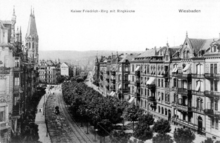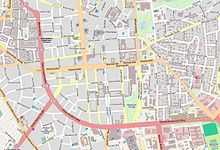Ringstraße (Wiesbaden)


The Ringstraße is a semi-circular, some 3 km long urban boulevard in the centre of Wiesbaden and the city's busiest and most prominent street system. The Ringstraße is a four up to six lane street and part of Bundesstraße 54. The ring road encircles the old town of Wiesbaden on its Southern and Western boundaries.
Sections
The Ringstrasse is a composition of three roads, for which it is known in German in the plural form (Ringe). The sections are named after people and personalities of the Germany. The following is a list of these sections, clockwise from South to West:
Gustav-Stresemann-Ring
The Gustav-Stresemann-Ring is the Southern end of the Ringstraße and is named after Gustav Stresemann, a German politician and statesman who served as Chancellor and Foreign Minister during the Weimar Republic. Gustav-Stresemann-Ring is some 950 metres long and joins the southern intersections with the Frankfurter Straße, New York Straße and the Berliner Straße, which leads as a dual carriage way to the Bundesautobahn 66.
- Statistisches Bundesamt
- Wiesbaden Central Station
Kaiser-Friedrich-Ring
The Kaiser-Friedrich-Ring is a wide, landscaped Avenue, with a central lawn and several lines of trees. This 1.4 kilometres long portion of the Ringstraße and with 40 metres width, it is one of its widest sections. The Kaiser-Friedrich-Ring is named after the German emperor Frederick III.
Bismarckring
At a length of 500 metres, the Bismarckring is the shortest sections of the Ringstraße. The name of the Bismarckring pays tribute to the Prussian-German statesman whose actions fostered the early unification Germany. The landscape is similar to the Kaiser-Friedrich-Ring section.
The Ringstrasse ends at Sedanplatz.
See also
Coordinates: 50°04′20″N 8°14′08″E / 50.07222°N 8.23556°E